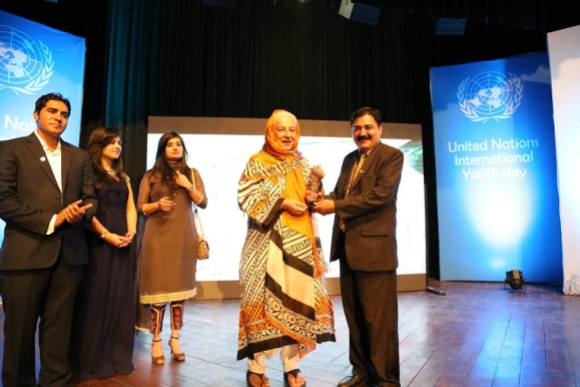
Editor’s note, April 25, 2017: Many of the usernames interviewed for this post have been blocked on the English Wikipedia as “sockpuppets” (“the use of multiple Wikipedia user accounts for an improper purpose”) of one another. These accounts constituted the bulk of the active editors on the Khowar Wikipedia. For more information, see a discussion on the English Wikipedia’s conflict of interest noticeboard and the sockpuppet investigation, conducted by Wikimedian volunteers unaffiliated with the Wikimedia Foundation. The post remains here for the sake of transparency without any claim of authenticity.
———
On 25 April 1996, a group of Khowar speakers led by Rehmat Aziz Chitrali formed Khowar Academy in Karachi to promote Khowar language and to preserve its manuscripts. In line with these objectives, Rehmat started the Khowar Wikipedia incubator project in 2010.
As of now, there are about 50 confirmed editors with the total number of articles, categories, templates, and other pages exceeding 6,700. Since the project is gradually advancing in terms of contributors and articles, we interviewed its founder Rehmat Aziz Chitrali, and four others, Zaheeruddin, Abdul Qayyum, Miraj Bibi, and Professor Mumtaz Hussain, about the project.
Rehmat Aziz Chitrali was involved in translating about one thousand system messages on Translatewiki—small messages within Mediawiki that are needed for the launch of Khowar Wikipedia. In addition, as a test admin, translator, and editor, Chitrali created a number of articles, categories, portals, modules, templates on the incubator Khowar Wikipedia. He stated that the site is “the world’s independent and free online encyclopedia” for a speaking base that “has increasing interest in developing the language.” His efforts for the incubator project are enthusiastically supplemented by Khowar Academy members Zaheeruddin, Amjad Mehmood, Akbar Ali, Abdul Qayyum and Tahir Shadan.
According to a survey by the the Academy, the total number of Khowar speakers is one million. While Pakistan is home to most of them, there are also Khowar speakers in Afghanistan, China, and at least 5000 in India, aside from an unspecified number of individuals forming diaspora in other countries. Rehmat hopes that there will be a gradual progress in the number of editors once the project is in full-fledged.
The respondents highlighted other facilitating factors such as the recent progress of school and university curricula in Khowar language in Pakistan, besides the recent award of doctoral degrees for research in the language. More recently, the website Mahraka was launched by Hussain with e-books, video and audio files. Khowar Academy and many Khowar intellectuals have come out with a number of books and periodicals in the language. Beside this, Khowar language also has newspapers, radio and television channels. A recent breakthrough has been the first television wild life documentary on the markhor, a goat native to parts of Afghanistan, Pakistan, and India.
Zaheeruddin believes that there is much potential for Wikisource, Wikibooks and Wikiquote once the Khowar Wikipedia is functional. On the other hand, Abdul Qayyum highlighted that many websites such Scribd and social media are already being widely used to promote Khowar language and its resources, including Khowar Wikipedia. As a word of caution, Miraj Bibi cautioned against the notion of overemphasizing some languages while downplaying others.
According to her, there is no such thing like a big language or a small one, and one of the reflections of honoring the rightful linguistic dignity is to launch free knowledge resources in each language such as Wikipedia.
Syed Muzammiluddin
Wikimedia community volunteer

Can you help us translate this article?
In order for this article to reach as many people as possible we would like your help. Can you translate this article to get the message out?
Start translation